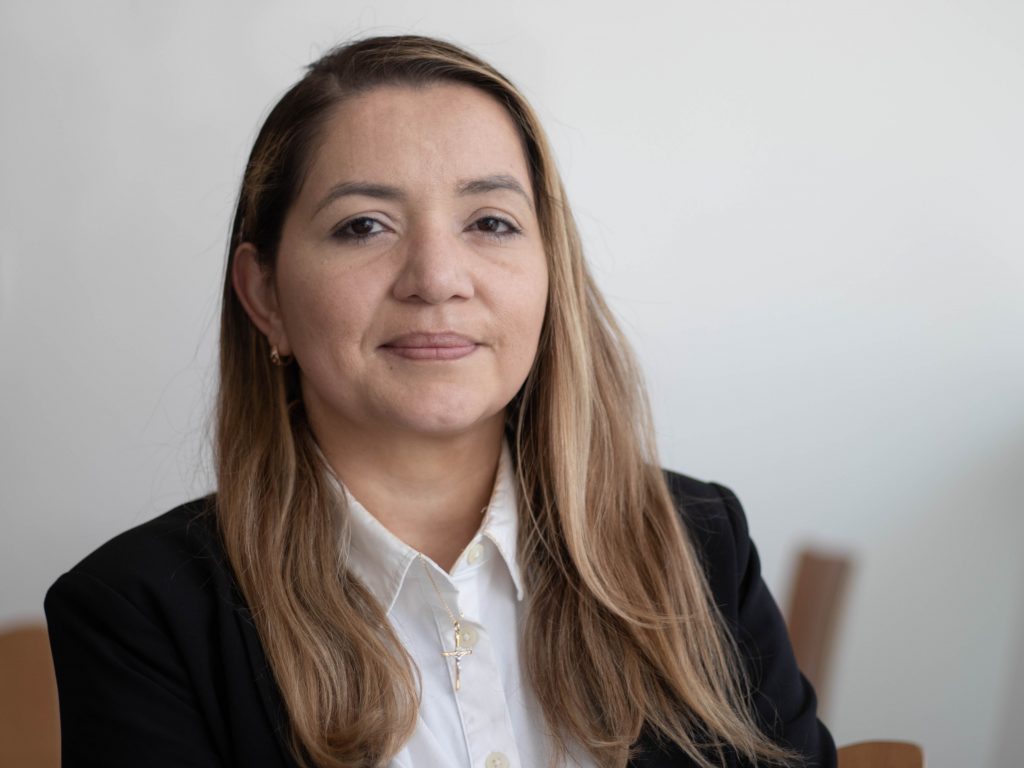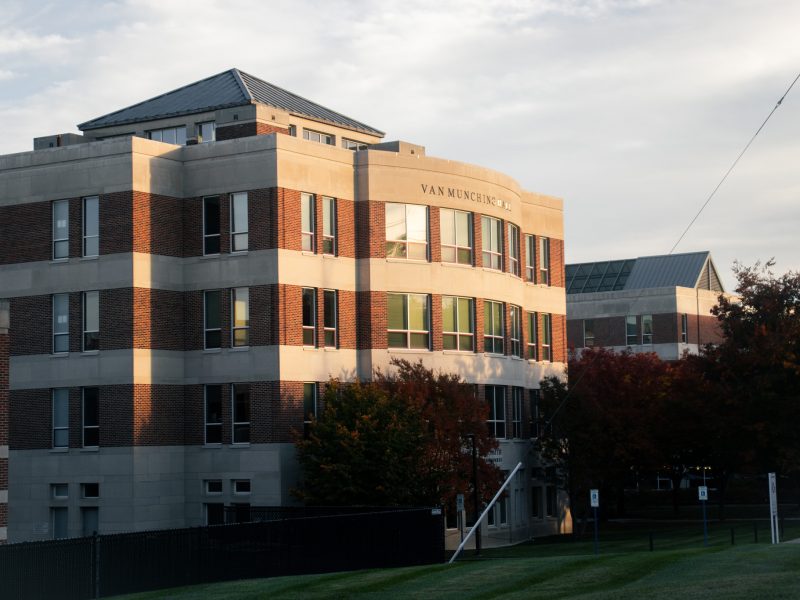At 10 years old, Lidia Gonzalez decided it was time for her to wash her own clothes and sleep in her own bed. But when nightmares crept in, she’d retreat to her grandmother’s bedroom.
As nightmares turned into anxiety about earthquakes in her hometown of San Vicente, El Salvador, her grandmother bought medicine to calm her nerves.
Eventually, however, Gonzalez’s troubles grew into an isolating depression and feelings of uselessness. Siloed in her bedroom for days, the senior accounting major skipped showers and picked up meals her grandmother left outside of her door.
Desperate to understand why she was sad all the time, Gonzalez would cry to her grandmother until she fell asleep on her lap.
“Everything is going to be okay … I don’t know what’s going on with you, but I’m praying and I know you will find a way,” Gonzalez recalled her grandmother saying.
But as understanding as her grandmother was, Gonzalez was left with no understanding of why she felt so sad.
Most conversations about mental health are highly stigmatized in the country, despite prevalent gang violence causing high levels of stress and post-traumatic stress disorder among Salvadorans, according to Samuel Nickels, a partner for the Association for Training and Research in Mental Health in El Salvador.
In the political sphere, gang violence has challenged Salvadoran national security for decades, with roughly 70,000 active gang members controlling swaths of territory throughout the country.
However, El Salvador is also one of the most conservative countries in the world, with a majority of its population adhering to either Catholicism or Fundamentalist, Pentecostal Christianity, Nickels added.
As a result, rural communities often seek help from religious leaders or traditional healers — called curanderos — to treat mental illness. It’s usually not until attempts to cast out evil spirits fail that families turn to a psychiatrist, Nickels said.
[Mental health stories beyond UMD: International students discuss mental health experiences]
Although frequenting church and rereading Bible scriptures her grandmother read when she was young helped Gonzalez remember the little things that made her happy, her anxiety kept growing.
Gonzalez’s grandmother raised her in El Salvador after her parents moved to California. But when she moved to Los Angeles to join her parents at age 18, her depression worsened. Her mother cast off her troubles as a rebellious teenager phase, labeling her cries as excuses for laziness.
After spending the following six months in a deep depression, laying awake at night or sleeping for 20 hours straight, Gonzalez’s father noticed her odd behavior and scheduled a call with a doctor.
Once she was told she had depression, Gonzalez started visiting a therapist and taking medication.
However, her mom’s outlook didn’t change. She thought Gonzalez was still lazy and that investing in her college education would be a waste of time.
Gonzalez’s mother didn’t believe in depression, she added, like many in her Salvadoran community who are scared to open up about compromised mental health. Despite the COVID-19 pandemic increasing awareness of mental health, the fear of judgment and social labels still turn people away from the traditionally taboo topic.
Although traditional values pervade much of the country, this lack of awareness also stems from the government’s significant underfunding of mental health resources. The country only has one psychiatric hospital with an inpatient program and outpatient treatment options suffer inconsistent supply.
“If you see a psychiatrist in the national psychiatric hospital, and then you go to the hospital pharmacy, you might wait for an hour or two in line,” Nickels said. “[If you] finally get up to the pharmacy … [you’re] told that the medication is not in stock right now.”
In the psychiatric hospital, patients suffering from a severe crisis are given electroconvulsive therapy, Nickels said. This practice shoots electric pulses to cause a brief seizure in the brain that temporarily helps to reduce psychosis or symptoms of major depression.
ECT is rarely used in the United States and Europe, and it’s only directed to people who have tried different medications that haven’t worked. The potential for memory loss, fractured bones and other side effects give the treatment a highly restricted set of protocols, including monitors, oxygen masks and mouth guards. Yet in El Salvador, such treatment sometimes occurs without anesthesia.
“That can cause people, rightly, to fear the psychiatric hospital and going there,” Nickels added. “[It] can [also] cause families to say, ‘Hey, I don’t want to take my loved one to the psych hospital because of the things that happen there to people.’”
The longer treatment is delayed, the more likely a person’s illness worsens. If the appropriate medications remain unavailable, the person may even become too unmanageable for the family, left either living on the streets or incarcerated due to a lack of services such as food stamps and disability income.
Although resources were more accessible once Gonzalez moved to the U.S., she still struggled to find happiness in Los Angeles. She worked the next two years to pay rent, as her mother wanted. But after a friend from Maryland advised her to move to the state, Gonzalez took the chance to continue her education.
Because she wasn’t 25 years old, she couldn’t apply for a loan without her parents’ permission, who denied her support out of fear they would be left liable to pay.
When Gonzalez finally got a loan in her own name, she enrolled at Montgomery College in 2017. However, going back to school as a first-generation college student was a taxing journey.
She started classes in business, communications and higher-level English, but even around other students who spoke Spanish, Gonzalez felt lost. Unaware of the meaning of grade point averages and midterm exams, Gonzalez’s nerves grew into exam-induced anxiety.
“When I started doing my first exam, I was so nervous that my mind went blank,” Gonzalez said. “I was like, ‘Oh my God, this cannot be happening to me.’”
The tick of clocks distracted her. Her hands sweat as she barely managed to write her name. Yet at the root of her anxiety was something new: frustration at the fact that she couldn’t express herself in English as well as Spanish.
[Students in South Korea begin to value self-care amid academic pressures]
Adapting to a new linguistic environment is demanding mentally, cognitively and emotionally for students, according to Jon Malone, the interim director of the Maryland English Institute, the University of Maryland’s on-campus English language instruction and assessment program for post-secondary-level English speakers.
In addition to learning a new language, English as a Second Language students are studying and taking exams in their second language. MEI works with many students who also have test anxiety, encouraging them to visit the Counseling Center to receive permission for additional time on tests.
Gonzalez sought similar help at Montgomery College, where her counselor suggested she get tested for attention-deficit disorders. However, because Gonzalez couldn’t afford the assessment, Montgomery College gave her an Accessibility and Disability Service letter to ensure she could receive accommodations at this university.
A few programs to destigmatize mental health in El Salvador are underway, including the Pan American Health Organization’s efforts to improve mental health services with the ministry of health in the country. Some European funding directed toward at-risk youth to deter gang involvement serves as an indirect resource for mental health where they can develop leadership skills and participate in art therapy.
Although community-based programs are limited, small projects such as Nickels’ Family to Family program under ACISAM provide support groups for caregivers and educational resources about mental illness to families.
“People respond really positively to it [and] they just say it changes their perspective,” Nickels said.
After Gonzalez’s brother was left disabled from multiple back surgeries and began expressing suicidal thoughts, Gonzalez’s mother started to understand the risks of compromised mental health. When Gonzalez’s mother experienced depression after a weight loss procedure, she called Gonzalez to apologize.
Although she wishes her mother understood sooner, Gonzalez is happy to have her family’s support.
“I’ve been helping myself through, [and] I have found meditation helps me, reading helps me,” Gonzalez said. “[But] it’s hard sometimes … I can be talking right now but maybe tomorrow I will not be able to stand, so I’m still working on the process.”



